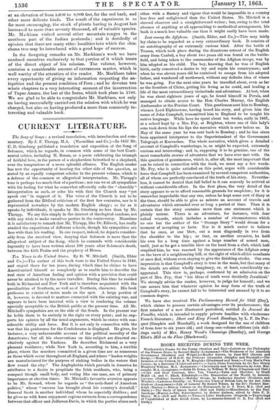Lost among the Afghans. (Smith, Elder, and Co.)—This may fairly
lay claim to be regarded as a very extraordinary book. It consists of an autobiography of an extremely curious kind. After the battle of Tezeen, which took place during the disastrous retreat of the English army from Caubul, a boy about two years old was found on the battle- field, and being taken to the commander of the Affghan troops, was by him adopted as his child. The boy, knowing that he was of English birth, early conceived a desire to try and rejoin his countrymen ; and when he was eleven years old he contrived to escape from his adopted father, and wandered off northward, without any definite idea of where he was going. For the next nine years he travelled about, even as far as the frontiers of China, getting his living as he could, and leading a life of the most extraordinary vicissitude and adventure. At last, when he was about eighteen years of age, he found himself in Persia, and managed to obtain access to the Hon. Charles Murray, the English Ambassador at the Persian Ceurt. This gentleman sent him to Bombay, whence Lord Elphinstone, having heard his story, and given him the name of John Campbell, transmitted him to England to be taught his native language. While here he spent about ten weeks, early in 1861, at a school kept by a Mrs. Fry, at Brighton, where one of this lady's sons took down from his lips the narrative which is now before us. In May of the same year he was sent back to B.ombay ; and he has since been appointed interpreter to the Superintendent of the Government Telegraph at Kurmchee. The whole narrative, which gives a detailed account of Campbell's wanderings, is, as might be expected, extremely curious and interesting ; and is, supposing it to be genuine, one of the most remarkable stories of adventure that we have ever met with. On this question of genuineness, which is, after all, the most important that can be raised in connection with the book, we must say a few words. Mr. Fry, who is quite satisfied on this point, urges with considerable force that Campbell has been examined by several competent authorities, all of whom are perfectly convinced of the truth of his story. Neverthe- less, it cannot be denied that full belief in it can scarcely be arrived at without considerable effort. In the first place, the very detail of the story appears to us to afford reasonable grounds for suspicion ; for it is somewhat improbable that any one, unless he kept some sort of diary at the time, should be able to give so minute an account of travels and adventures which extended over so long a period of time. Then it is certain that the story contains more than one statement, which is plainly untrue. There is an adventure, for instance, with . four naked wizards, which includes a number of circumstances which no one but the author of the "Strange Story" would dream for a moment of accepting as facts. Nor is it much easier to believe that he once, at one blow, cut a man diagonally in two from the shoulder to the hip ; or that, on another occasion, he held his own for a long time against a large number of armed men, until, just as he got a terrible blow on the head from a club, which half stupified him, he was rescued by the appearance of the Affghan army on the brow of a neighbouring hill, at the sight of which all his assailants at once fled, without even staying to give the finishing stroke. Our own impression is that Campbell's story is true in the main, but that many of the details are either wholly imaginary, or, at least, considerably ex- aggerated. This view is, perhaps, confirmed by an admission on the part of Mrs. Fry, that "his ideas of truth were decidedly JesuiticaL' We strongly advise the reader, however, to judge for himself; and we can assure him that whatever opinion he may form of the truth of Campbell's story, he cannot fail to be interested and amused by it to no common degree.
We have also received The Parliamentary Record for 1862 (Day), which claims to possess certain advantages over its predecessors ; the first number of a new illustrated periodical, entitled Le Journal des Families, which is intended to supply private families with wholesome French literature ; Short and Easy French Readings, by L. F. De Por- quet (Simpkin and Marshall), a work designed for the use of children of from four to six years old; and cheap one-volume editions (six shil- lings each) of Mrs. Henry Wood's Channings (Bentley), and George Eliot's Mill on the Floss (Blackwood).






























 Previous page
Previous page